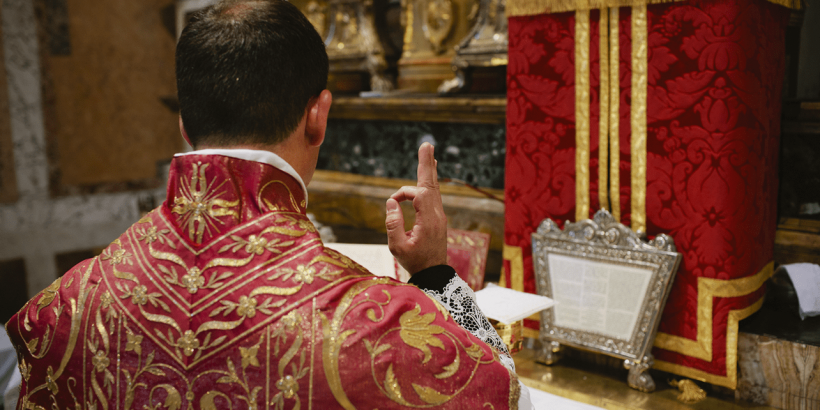It seems clear that the replacement of Latin with other languages in Mose celebrations of the Novus Ordo Mass of the Latin Catholic Church, has led to a loss of Latinity, and with it, a shift from an emphasis on what is eternal, unchanging, and universal, to one on what is contemporary, ever-changing, and localised. By “Latinity” I mean, first of all, the use of the Latin language. Secondarily, the term refers to the culture and mentalities which are expressed in that language: a prime example of which is Gregorian chant. But Latinity also includes schools of thought such as Roman Stoicism, and medieval Scholasticism, and the ethic which was transmitted in Roman poetry. Some of this ethic was formidable, such as the sense of piety and honour which had a place in the Aeneid. On the other hand, some of this ethic was scurrilous, and there was much in-between.
However, the Tridentine Mass was and is said only in Latin, thus providing a Church which prides itself on being global (hence catholic), with a global language. It was once a widely celebrated fact that Catholics could travel anywhere throughout the world, and find the Mass celebrated in the one language, and embodying the same religious culture. The Latin of that Mass is, for us, eternal – it has been pretty much as it is now since the dawn of Western civilisation. For all practical purposes, it never changed. From this perspective, even allowing the use of vernacular languages to assist missionary work in the 20th century, followed by the changes to Holy Week were errors of judgment, albeit well-intentioned, since they established the principle that the Pope could unilaterally change the liturgy. The addition of the name of St Joseph in 1962, likewise, entrenched this principle, extending it into the Canon.
As an aside, if it was deemed that the Latin language would impede conversions so seriously that it had to be abandoned, and a local language used, then the solution would, I suggest, have been to establish another sui juris Church (just as the Maronite, Armenian Catholic, and Ukrainian Catholic Churches are autonomous Churches with their own liturgies). That way, the liturgies and rituals could have been adapted for the relevant cultures to form an integrated whole, taking into account traditional cultural values, e.g. in China, the reverence for ancestors. But just to translate the Mass into another language once it has been determined that that is what is needed then ignores the culture in which the Mass will be “swimming,” so to speak. So, I think there were two good alternatives: keep the Latin but teach it, or establish a new Rite with its own rituals and sacred ceremonies, based on the Latin but adapted to the relevant society and culture.
But this is not my main point: that is how once the Latin Mass was untethered from the Latin language, it was also untethered from Latinity, which was much to be avoided, since Latinity was the vehicle for the venerable traditions, not least the hymns and theology of the Latin Church. If, rather than abandon Latin, the Church had made efforts to teach that tongue to the people, then they would immediately have access to the entire Latin tradition, and it would be a shared tradition. The Latin tradition could have had a role in keeping the Universal Church united. If all Latin Catholics learnt that language, they would have a shared knowledge of the classics of the Latin language, and many of these, such as Seneca and Augustine would have brought a richness to Catholic culture. Instead, today, even different Latin churches in the one city can be foreign countries for people from another church in the same city. Some people come to our Maronite English liturgies because their local Latin Novus ordo is in a language they do not understand, or they cannot abide the guitars and drums which are favoured in their local church.
It was blithely imagined that there was “a vernacular” into which the Novus ordo would be translated, and that would make everyone happy, but in fact there is an ever-increasing coexistence of different “vernaculars” in our multi-cultural society. Rather than making the liturgy understandable by all, the changes have had the effect of making the churches something of a Tower of Babel, in which there is less understanding than before. Another aspect of this is that what everyone understood, even implicitly, until they were taught to think otherwise, was that even if they did not know what the Latin meant, they nonetheless grasped what the ceremony meant. People who were raised before they were told – directly or indirectly – that it was desirable they understand the words of the liturgy, were generally quite satisfied with understanding that it was a sacred and mysterious rite in which the supernatural occurred, and it was only natural that the use of a sacred language brought that home. Just consider, why else does Harry Potter use Latin or other foreign-sounding words for his spells?
The application of this to the Maronite Church is clear: we need, I suggest, to keep the Syriac and maybe even to expand it. I would suggest that we all learn the Our Father in Syriac, and if that takes, the blessing and response after Communion. It is the Syriac which unites the Maronite Church, or at least its liturgies, wherever they are celebrated. We must teach it.
